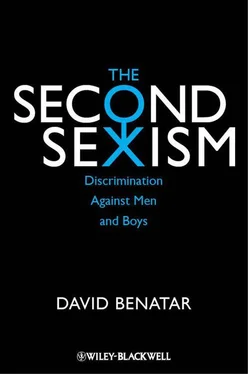These definitions of sexism are, in one sense, broader than mine, but in another sense they are narrower. It will be recalled that I have defined “sexism” as wrongful discrimination on the basis of a person’s sex. The definitions of Professors Frye and Wasserstrom are broader in the sense that they focus not on an individual act, but a system into which the act does (or does not) feed. However, their definitions are narrower than mine in another sense. If we follow their lead, fewer actions will count as sexist. This is because it is only a subset of actions that wrongly discriminate against people on the basis of their sex that creates or contributes to hegemonies.
What can be said in favor of the definitions that compete with mine? Professor Frye asks us to consider the following case:
If a company is hiring a supervisor who will supervise a group of male workers who have always worked for male supervisors, it can scarcely be denied that the sex of a candidate for the job is relevant to the candidate’s prospects of moving smoothly and successfully into an effective working relationship with the supervisees. 19 19 Marilyn Frye, The Politics of Reality , p. 18.
This case is intended to show that unfair discrimination cannot consist merely in treating people differently on the basis of an arbitrary or irrelevant attribute such as their sex. This is because, it is said, sex is not irrelevant in this case to the ability to perform the job. What Professor Frye finds problematic about the case is that if a woman is not hired, this will feed into a broader system in which females are disempowered.
I agree that systems can be sexist and I agree that systematic exclusion of women from particular positions is sexist. However, I deny that unfair discrimination must reach the systemic level in order to constitute sexism. I shall say more about this later, but now I shall indicate why the “irrelevant characteristic” view is able to account for Professor Frye’s case. First, we should note that the relevance of the applicant’s sex in her case is dependent on the attitudes of those workers who will be supervised. If they had different attitudes to women or to female supervisors then a female supervisor would be able to function as effectively as a male one. Thus we need to ask whether the differential attitude that the workers have toward male and female supervisors was based on an irrelevant characteristic. The answer to that question is affirmative and thus we could conclude, following the view that Professor Frye rejects, that the workers have sexist attitudes.
There is now a secondary question whether the people hiring the supervisor should take those sexist attitudes as a given or whether they should override them. While I doubt that a categorical answer can be given to this question, I strongly suspect that much more often than not, they should not pander to the sexist views. For example, historical experience suggests that pandering to such views only reinforces them (which is problematic, independent of systemic concerns). By contrast, resisting prejudice by opening positions to people irrespective of their sex (or race), although it can have teething problems, helps to break down prejudicial attitudes. In all cases where those hiring should hire the woman despite the workers’ attitudes, pandering to sexism could be said to be derivatively sexist.
Professor Wasserstrom provides a different case. He says that what was primarily wrong with human slavery was “not that the particular individuals who were assigned the place of slaves were assigned there arbitrarily because the assignment was made in virtue of an irrelevant characteristic, i.e., their race.” 20 20 Richard Wasserstrom, “On racism and sexism,” p. 347.
Instead, he says, the primary problem is with the practice itself — “the fact of some individuals being able to own other individuals and all that goes with that practice.” 21 21 Ibid.
Does the case of human slavery really show that the “irrelevant characteristic” account of racism or sexism fails? I do not think so. There are at least two possible alternative reasons. According to the first, it is precisely because what is primarily wrong about slavery is that people are treated as chattel that the wrong is not primarily one of discrimination. Given this, it should be unsurprising that racism fails to provide an exhaustive account of what is wrong with slavery. Of course, where race is the criterion for who may be enslaved, then racist discrimination is a further wrongful feature of slavery, but there is no reason to think that the underlying wrong of slavery must be explained in terms of racism and thus in terms of the “irrelevant characteristic” account of racism. What this nicely illustrates is that some actions may be wrong for more than one reason and that discrimination may sometimes be a compounding wrong rather than the primary wrong.
Alternatively, perhaps we can fully explain the wrong of slavery via the “irrelevant characteristic” account. There is no moral problem with humans owning machines and treating the machines as chattel. There is a problem with humans owning other humans and treating them as chattel. What explains this difference? It is the fact that there are relevant differences between machines and humans. It is these differences that make it wrong to own humans but not machines. When people have thought that some humans may be owned on account of their “race,” they have mistakenly taken a person’s “race” to be a relevant difference from those humans who may not be owned. They have mistakenly treated being black as being like a machine or some other object that may be owned. According to this explanation, it is wrongful discrimination that explains why the wrong of slavery is inflicted on particular people. A given person is enslaved only because of his race. Had he been a member of another race he would not have been enslaved.
Now, even if one rejects these responses to Professors Frye and Wasserstrom and maintains that sexism is not merely a matter of treating people differently on the basis of an irrelevant characteristic, one need not embrace their definitions of sexism. One could retain the view that sexism is unfair or wrongful discrimination on the basis of a person’s sex, but deny that this consists of treating people differently on the basis of their sex when their sex is indeed irrelevant. One could prefer an alternative account of wrongful discrimination, while still identifying sexism as wrongful discrimination. Rejecting the “irrelevant characteristic” account of wrongful discrimination does not entail the view that sexism must satisfy a systemic criterion or must involve domination, subordination or oppression.
So far I have argued that we do not need to abandon the understanding of sexism as wrongful discrimination on the basis of a person’s sex. Now I wish to say why we should not abandon it in favor of the alternatives I have outlined. Accepting the requirement that discrimination be systemic and involve subordination, domination or oppression would do violence to ordinary language.
In our ordinary usage, we speak of prejudicial and discriminatory “isms” in the absence of overall and systemic disempowerment. If a teacher were to assess a student’s work more harshly merely because that student was white or male, we would ordinarily label that action racist or sexist (in addition to being wrong on other grounds). People do use the words “racism” and “sexism” in such contexts. Nor is this usage restricted to non-philosophers. Peter Singer, for example, understands speciesism and racism in terms of treating beings differently on the basis of arbitrary or irrelevant differences. 22 22 Peter Singer, Animal Liberation , 2nd edn, New York: New York Review of Books, 1990, pp. 18–19.
Читать дальше
Конец ознакомительного отрывка
Купить книгу












